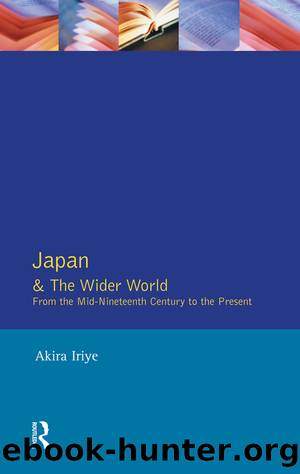Japan and the Wider World by Akira Iriye

Author:Akira Iriye [Iriye, Akira]
Language: eng
Format: epub
Tags: History, Asia, Japan, General, Political Science
ISBN: 9781317894087
Google: Mw-PBAAAQBAJ
Publisher: Routledge
Published: 2014-09-19T01:24:23+00:00
Chapter 9
THE RESUMPTION OF
JAPANESE DIPLOMACY
Until about 1949, the Cold War was primarily characterized by ideological and political antagonism between the United States and the Soviet Union. But then it steadily came to take on a military character, so that by 1952, when Japan regained independence, international affairs had come to signify a world divided militarily. Put another way, the ideological confrontation was being elevated to a military level because of the failure of the two sides to contain the crisis, and because the world had neither an effective mechanism nor a strong movement to prevent such a development.
Already in 1949, the United States joined the Western European countries as well as Canada to form the North Atlantic Treaty Organization, the first peacetime alliance the nations had ever formed. It is true that at first there was much ambiguity about NATO (for instance, whether it was to entail the stationing of US forces in Europe, or whether West Germany was going to join the system), but it was clearly aimed at the Soviet Union and the Eastern bloc, thus confirming the division of Europe into two military camps. The Soviet Union, for its part, had kept its troops in Eastern European countries, and, in Asia, signed treaties of alliance with Communist China and North Korea. (Korea had become divided in 1948 into the Democratic Peopleâs Republic of Korea north of the thirty-eighth parallel and the Republic of Korea to the south.)
The militarization of such a polarized world was evident in the defence expenditures of the two super-powers. As noted above, before 1949 their military budgets had not been particularly large, but then the situation changed rather drastically. The US defence spending increased from $13.0 billion in 1949 to $33.3 billion two years later. This, of course, was due to the expenses of the Korean war, but even before its outbreak, the draft NSC-68, the document prepared by the National Security Council for coping with Cold War challenges, had called for substantial increases in defence outlays. The Soviet Union, in the meantime, successfully conducted atomic tests in 1949 and continued to augment its armed forces. Whereas its actual defence expenditure in 1950 was roughly one-half of the US figure, even this accounted for a larger share of the Soviet national income than the corresponding figure for the United States. Without doubt, starting around 1950 the superpowers were engaging themselves in an arms race.
This situation was confirmed during the Korean war. Americaâs quick response to the North Korean invasion of the south, in June 1950, was not surprising, given the militarization of the Cold War which had already begun to take place. Thus, for the Soviet Union a successful unification of the Korean peninsula by Pyongyang would turn the Asian military balance in its favour, while, for exactly the same reason, the United States would have to prevent such an outcome. Moreover, the Americans were determined to stop Communist Chinaâs liberation of Taiwan, for such a step would also add to Soviet-bloc power.
The
Download
This site does not store any files on its server. We only index and link to content provided by other sites. Please contact the content providers to delete copyright contents if any and email us, we'll remove relevant links or contents immediately.
| Central Asia | Southeast Asia |
| China | Hong Kong |
| India | Japan |
| Korea | Pakistan |
| Philippines | Russia |
The Sympathizer by Viet Thanh Nguyen(4370)
The Rape of Nanking by Iris Chang(4189)
World without end by Ken Follett(3457)
Ants Among Elephants by Sujatha Gidla(3450)
Blood and Sand by Alex Von Tunzelmann(3180)
Japanese Design by Patricia J. Graham(3150)
The Queen of Nothing by Holly Black(2573)
City of Djinns: a year in Delhi by William Dalrymple(2542)
Foreign Devils on the Silk Road: The Search for the Lost Treasures of Central Asia by Peter Hopkirk(2451)
India's Ancient Past by R.S. Sharma(2438)
Inglorious Empire by Shashi Tharoor(2423)
Tokyo by Rob Goss(2417)
In Order to Live: A North Korean Girl's Journey to Freedom by Yeonmi Park(2370)
Tokyo Geek's Guide: Manga, Anime, Gaming, Cosplay, Toys, Idols & More - The Ultimate Guide to Japan's Otaku Culture by Simone Gianni(2352)
India's biggest cover-up by Dhar Anuj(2342)
The Great Game: On Secret Service in High Asia by Peter Hopkirk(2325)
Goodbye Madame Butterfly(2241)
Batik by Rudolf Smend(2167)
Living Silence in Burma by Christina Fink(2052)
